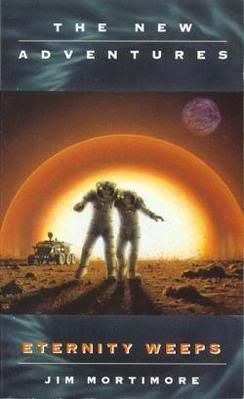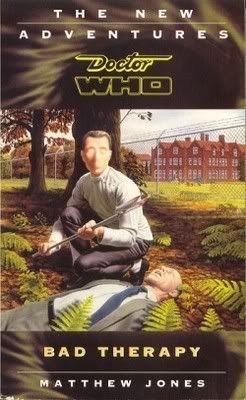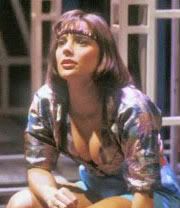
Eternity Weeps by Jim Mortimore
In Brief: The end of Bernice and Jason's brief marriage set against a backdrop of global apocalypse.
Eternity Weeps is grim. It's dark. It ends with the death of millions and the near destruction of the Earth. It's also brilliant, rather funny but somehow unsatisfying. Normally mixing a tale of death and destruction with overt humour shouldn't work, or would come across in bad taste. Of course this being set in the universe of Doctor Who having horror and humour sit side by side is really business-as-usual. But still what could have been great just ended up feeling a bit limp.
Perhaps it's the mixing of the apocalyptic with the mundane as the Earth being almost destroyed due to an ancient alien terraforming device being pushed into the background of the end of Bernice and Jason's marriage. As Agent Yellow turns the world into acid the two lovers find that the feelings that once kept them together has started to create an unfixable rift. The blame and mutual hurt become too much for either to handle and just as the solution to Agent Yellow results in a damaged world so do their actions damage their marriage.
In order to have this story be *about* Jason and Benny despite the potential end of the world and death of millions of people is that Mortimore has written the book from Benny and Jason's point-of-view. Each chapter alternates between being written from one of their perspective. So by the end we really understand why they just can't go on together.
The Doctor and Chris are involved in events once Benny calls the Tardis in using her and Jason's Doctor-provided Time Rings when their expedition in 2003 Turkey to find Noah's Ark starts going wrong. However they're seen very much from a distance, filtered through Jason/Benny's POV. Chris remains the rather light and useless character he's always been, other than being a somewhat generic man-of-action (and still mourning the death of Roz) he doesn't really have any presence. I still don't quite *get* why he was every introduced or why the range kept him around for so long since he's always been rather one-note. He's the eternal innocent who just happens to be a tall blond hunk of muscle, as just as boring as you'd expect.
I've often felt that the character of The Doctor works better the less we know about him and his thoughts. This is the opposite end of the (somewhat annoying) portrayal of the character in Bad Therapy where is was at the centre of things. However here he's pushed almost completely to the sidelines, almost becoming an incidental character as Bernice and Jason carry most of the novel.
If it seems as if I'm somewhat keeping from really getting into the plot of the book it's mainly due to the realisation by the end that Eternity Weeps is Jim Mortimore's greatest example of completely messing with his readers. He's taken his beloved large, uncontrollable and dangerous universe of Lucifer Rising and Parasite and brought it down to Earth with horrible consequences. It starts grim, it stays grim but then at the end we discover that it's actually all just been a bit of a joke. Albeit a very very dark joke.
Eternity Weeps is a clever and well-written novel but ultimately somewhat frivolous. With the plot being pushed into the background and the non-regular characters being killed normally within a few pages of their introduction (including a returning Liz Shaw) nothing really has much of an impact. But then I suppose it's just the sort of thing a deranged yet talented author would do: take the apocalypse and make it mundane.
So the book ends up is a well-made exercise in futility. Of course that was probably the point.


